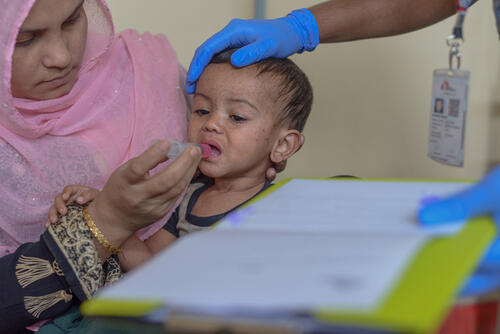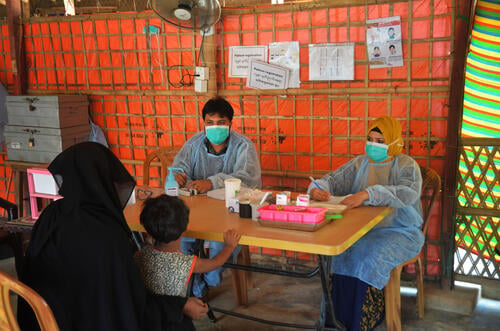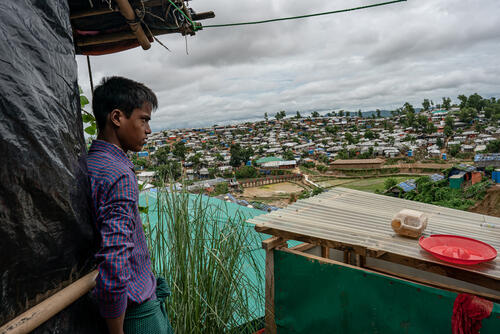In a pink room decorated with white flowers at Médecins Sans Frontières’ (MSF) Kutupalong field hospital in the Cox's Bazar district of southeastern Bangladesh, a woman lies curled around her sleeping child. Next to her, a young mother cradles a baby whilst her other daughter plays with a balloon.
Rows of beds stretch in either direction, mothers and children sitting or lying quietly in each one. It could be a peaceful scene, except for the intravenous lines snaking up from each child’s arm to a saline drip.
Wards full of children sick with a disease they shouldn’t have caught
This is an isolation ward and all these children are critically ill with measles. Many have additional complications, such as pneumonia and malnutrition. The nurse checks vital signs every hour. For a ward full of young children, it is eerily silent – most of them are semi-conscious.
None of these children should be here. Measles is a preventable disease; a simple and safe vaccination protects against the illness. With routine immunisation, these children should not have caught the virus.
Neither should this ward exist. It is usually an intensive feeding unit for severely malnourished children. But four weeks ago, to cope with the growing number of critical measles cases needing inpatient intensive care, staff had to transform it into an emergency isolation ward.
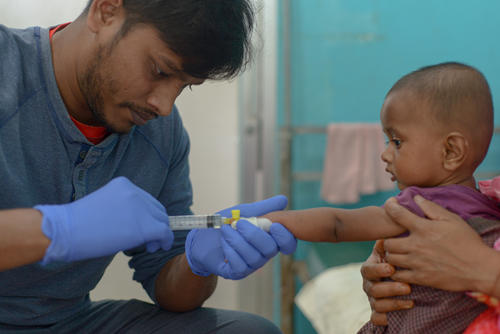
In the first four weeks of the year, MSF saw a 40 per cent jump in measles cases treated in our facilities in the refugee camps. In January alone, around 120 patients were admitted to MSF isolation wards, with more than 900 people treated as outpatients.
“Since November the cases have been increasing and increasing,” explains Mohammad Younus Ali, an MSF nurse in the Kutupalong Hospital. “Now it’s overflowing.”
Measles hits young kids the hardest
A highly contagious airborne virus, measles is particularly dangerous for children, putting them at risk for severe pneumonia, encephalitis and death. Over 80 per cent of MSF’s current measles patients are under the age of five. Thirteen have died from measles in MSF clinics since the outbreak started.
Nurata’s nine-month-old daughter Nur Salima first developed a fever six days ago and received treatment in Kutupalong hospital. Nurse Younus explains that baby Nur Salima was barely conscious when she arrived in the emergency room.
“I saw [Nurata’s] face at the day of admission; there was lots of fear in her face,” says Younus.
The doctors gave her daughter oxygen to help her breathe, and antibiotics to fight secondary infections. Severe respiratory infections and difficulties breathing are common complications with critical measles cases.
MSF doctor Nowshad Alam Kanan describes how young children arrive at the clinic, gasping for breath. “It’s just like suffocating,” he says.
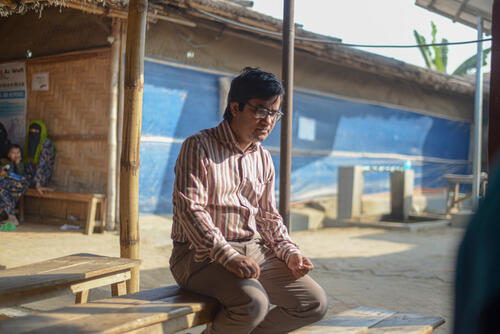
MSF providing treatment in overwhelmed health centres
Seven kilometres away, in the southern part of the refugee camp, MSF is receiving patients in Jamtoli health clinic. Like others, this clinic is also overwhelmed. As a primary health centre, the isolation ward has five beds, which is normally sufficient – except now the clinic has been receiving 10 to 15 patients daily, according to Dr Nowshad.
In Jamtoli’s isolation ward, Romida and her husband Abu Sufian watch over their ten-month-old son Forkan. The couple got married in the refugee camp, and Forkan is their first child.
His face is covered with the telltale red measles rash, his eyes swollen and gummed shut. Listless and in pain, he writhes on his mother’s lap as she rocks him gently. Concern is etched on the young parents’ faces.
When her son became sick, Romida was so scared she stopped eating. Suffering from a high fever, diarrhoea and experiencing difficulty breathing, Forkan had also refused to drink.
Now, a nurse hands Romida a syringe filled with an oral rehydration solution, which she gently tries to drip into her son’s mouth. Measles can cause oral infections, which makes eating and drinking exceptionally painful. Despite her encouragement, little Forkan will not drink.
Lack of vaccination leaves people fighting for life
The Rohingya have suffered decades of persecution and restrictions on healthcare in Myanmar; as a result, most people never received routine immunisation for infectious diseases. The lack of quality routine immunisation for Rohingya refugees in the camps means that babies like Forkan who are born here are at risk of catching preventable infectious diseases like measles.
After five days in the isolation ward, Nurata’s daughter Nur Salima improved and was finally strong enough to be discharged. Having nursed her back to health, nurse Younus is delighted. The feeling of watching a patient survive “is indescribable” he says, overjoyed.
Forkan, however, is still fighting. Unable to drink any fluids, he was transferred to MSF’s Goyalmara hospital for intensive care. MSF’s team will do everything they can to save his life.
Médecins Sans Frontières (MSF) started working in Bangladesh in 1985. Over the years, MSF has provided free and essential medical care across the country, including in Fulbaria, Chittagong Hill Tracts and Kutupalong. Since 1992, MSF has had a permanent presence in the country and currently run facilities in Kamrangirchar, Dhaka and Cox’s Bazar district.



